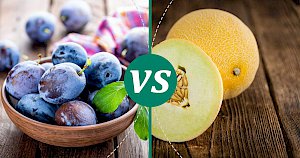Melon vs Plum: Health Insights
Where is more calories, protein, carbs - what is more healthy?


Plum vs Melon: Nutrition Comparison
| per 100g | Melon | Plum |
|---|---|---|
| Calories | 34 | 46 |
| Carbohydrates | 8.6 g | 11.42 g |
| Fat | 0.19 g | 0.28 g |
| Dietary fiber | 0.9 g | 1.4 g |
| Protein | 0.84 g | 0.7 g |
| Calcium | 9 mg | 6 mg |
| Iron | 0.21 mg | 0.17 mg |
| Magnessium | 12 mg | 7 mg |
| Potassium | 267 mg | 157 mg |
| Sodium | 1 mg | 1 mg |
| Zink | 0.18 mg | 0.1 mg |
| Vitaminium B1 (Thiamine) | 0.017 mg | 0.028 mg |
| Vitaminium B2 (riboflavin) | 0.026 mg | 0.026 mg |
| Vitaminium B3 (Niacin) | 0.734 mg | 0.417 mg |
| Vitaminium B5 | 0.105 mg | 0.135 mg |
| Vitaminium B6 | 0.072 mg | 0.029 mg |
| Vitaminium B9 (Folic acid) | 21 mg | 5 mg |
| Vitaminium C | 36.7 mg | 9.5 mg |
| Vitaminium E | 0.05 mg | 0.26 mg |
| Vitaminium K | 2.5 mg | 6.4 mg |
| Beta karoten | 2020 mg | 190 mg |
Less Calories in Melon
At first glance, you can see that in melon is less calories than in plum.
Melon has 34 kcal per 100g and plum 46 kcal per 100g so it is pretty easy to calculate that the difference is about 35%.
In melon and in plum most calories came from carbs.
See tables below to compare melon with plum in details.
Melon And Plum Nutrition Difference
- Calories:
plum - 35% more than melon - Carbohydrates:
plum - 33% more than melon - Fat:
plum - 47% more than melon - Dietary fiber:
plum - 56% more than melon - Protein:
melon - 20% more than plum
More protein in melon
It is aslo easy to see see that in melon is more protein than in plum.
There is 0.7g per 100g of plum and 0.84g per 100g of melon so using simple math we can see that difference is about 20%.
Less carbohydrates in melon
In melon is less carbohydrates than in plum.
There is 11.42g/100g of carbohydrates in plum and 8.6g/100g in melon so let me do the math for you again - difference is about 33%.
Less fat in melon
In melon is less fats than in plum.
The tables above show us that there is 0.28g/100g of fats in plum and 0.19g/100g in melon. In this case difference is about 47%.
Melon
34kcal- Calories34
- Carbohydrates8.6 g
- Fat0.19 g
- Dietary fiber0.9 g
- Protein0.84 g
100g | ounce | single piece | slice | cup | half cup
Calories source
- 87% CARBS.
- 9% PROTEIN
- 4% FAT
Plum
46kcal- Calories46
- Carbohydrates11.42 g
- Fat0.28 g
- Dietary fiber1.4 g
- Protein0.7 g
100g | ounce | single piece | cup | pitted
Calories source
- 90% CARBS
- 5% PROTEIN
- 5% FAT
Vitamins: plum vs melon
- Vitaminium B1 (Thiamine):
plum - 65% more than melon - Vitaminium B2 (riboflavin):
plum - 0% more than melon - Vitaminium B3 (Niacin):
melon - 76% more than plum - Vitaminium B5:
plum - 29% more than melon - Vitaminium B6:
melon - 148% more than plum - Vitaminium B9 (Folic acid):
melon - 320% more than plum - Vitaminium C:
melon - 286% more than plum - Vitaminium E:
plum - 420% more than melon - Vitaminium K:
plum - 156% more than melon - Beta karoten:
melon - 963% more than plum
Minerals: melon vs plum
- Calcium:
melon - 50% more than plum - Iron:
melon - 24% more than plum - Magnessium:
melon - 71% more than plum - Potassium:
melon - 70% more than plum - Sodium:
plum - 0% more than melon - Zink:
melon - 80% more than plum
Compares of melon
- Melon vs Apple
- Melon vs Apricot
- Melon vs Avocado
- Melon vs Banana
- Melon vs Blueberries
- Melon vs Cherries
- see all compares of melon
Compares of plum
Read also:
- Calories from Melon
- Calories of Cherimoya
- Calories in Cherry
- Cranberry calories per 100g
- Dates carbs per 100g
- Durian protein per 100g
- Black lilac fat per 100g
- How many calories does fejhoa have?
- Calories in handful of Goji berries
- Calories in tablespoon of Goji berries
- Calories in teaspoon of Goji berries
- How much protein in gooseberry?
Marcin Piotrowicz
calories-info.com creator
Healthy diet and healthy lifestyle promoter
Add comment